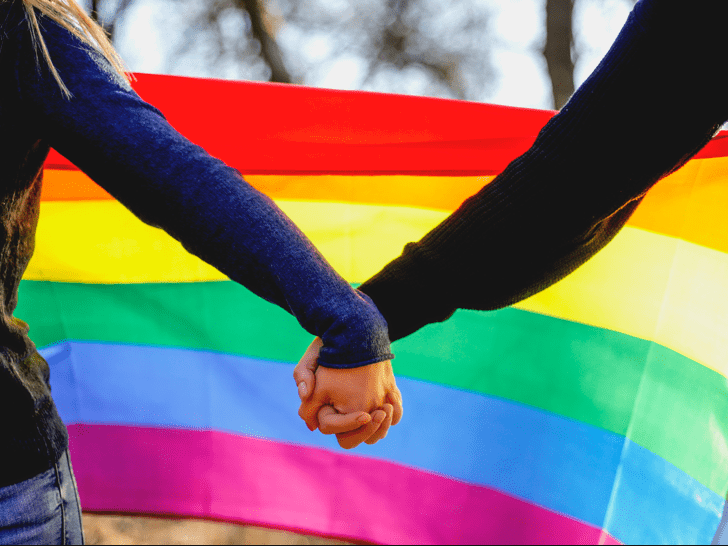By: Emily Berry
I was 12 when I realized I was different. While most of my girlfriends spent the majority of gym class fixing their hair and flaunting over the boys playing basketball, I was always out there with the boys dominating the court. I was athletic and loved a good competition. I never thought much of it. Until one day one of the girls asked me how I can hang out with Jared, the cutest boy in the school, all the time without falling in love with him. I didn’t know how to answer.
Yeah, I hung out with Jared a lot. And yeah, I felt nothing for him more than being his friend. In fact, I felt nothing more than friendship for any of the boys that I hung out with. Which, I guess is weird for a seventh-grade girl who’s on the brink of puberty. I was 12 when I realized I was different. I was 12 when I realized that I liked girls.
Now I know a lot of you are probably thinking, being gay does not make you different. And now, at the age of 21, I realize that, but I grew up in a small town where no one talked about anything other than a husband and a wife. It was the early 2010s, so there was not much representation on television.
When I was 12 and discovering myself, I had no idea what being gay was. All I knew was that I was different. So I did what I thought was normal and I started dating Jared.
Self-concept is an essential part of growth and always developing. Our self-perception is strongly influenced by how we compare to others and the messages we receive from them. Growing up, I had no one other than straight people to compare my sexuality to. I had no one telling me that girls can like girls. I had no one that was like me to validate my concept of myself. Positive validation is a crucial aspect of helping questioning LGBTQ individuals grasp a strong, healthy sense of self.
In a study published by the Health Communications Journal, communications studies professor Valerie Rubinsky of Ohio State University and Angela Cooke-Jackson of Emerson College researched memorable messages that people who identify as both women and LGBTQ receive about sex and sexuality. Their purpose was to discover how those messages influenced the individuals’ self-concept.
They surveyed 91 women, who came from purposeful, volunteer and snowball samples on several social media platforms: Reddit, Tumblr, Facebook, Twitter and the “Communications, Research, and Theory Network.”
The study found that LGBTQ women’s most memorable messages were those that fit into three categories: challenging, affirming and neutral.
Challenging messages are disaffirming, undermining and include erasure. They include phrases like “homosexuality is wrong” and “sex should only be between a man and a woman.”
Affirming messages are those that validate and support. An example is someone saying “It is okay to be gay” and “you don’t owe sex to anyone.”
Neutral messages are those that focus on behavior rather than identity, such as saying “wait until you are ready.” They can be positive or negative.
Out of all of the messages they analyzed, the most common source was parental figures, specifically mothers, and other family members. This is notable because most people develop their first sense of self from their parents and other family members.
They are arguably the most influential people in an individual’s, especially a child’s, life. Their words are powerful and can be the difference between someone having a positive or negative sense of self.
A later study, published in the Journal of Social and Personal Relationships and conducted by Luis Parra of the University of California Davis and some of his colleagues, further researched the topic of family’s impact on queer individuals’ self-concept.
Parra examined how lesbian, gay and bisexual people are impacted by negative family attitudes. Specifically, he examined whether the impact of rejection by a person’s family is lessened by peer support.
The study’s participants were 27 lesbian and bisexual women and 35 gay and bisexual men. They were recruited from colleges in and around Montreal.
The participants were surveyed about their sexual orientation, how their families responded when they disclosed their orientation, peer social support, anxiety and depression symptoms, internalized homonegativity and self-esteem.
The researchers found that people who had a strong peer support system were less likely to experience depression and anxiety symptoms even if their family is unsupportive.
Sometimes, having a supportive friend can make all the difference in the life of someone who is questioning or experimenting with their sexuality.
If I had a supportive friend to confide in when I was 12 or a family that talked about queer issues, maybe I would not have thought I was different.
Instead, I had no one to validate my identity.
No one explained to me that it is okay to like girls. No one told me that they would love me regardless.
We live in a world now that gives me hope that youth who are questioning their sexuality will receive validation from someone in their lives to help them develop a strong sense of their authentic self: one that lets all the “different” 12-year-olds like me know that it’s okay to date a Julia instead of a Jared.
Cover image: nationalmortgageprofessional.com
